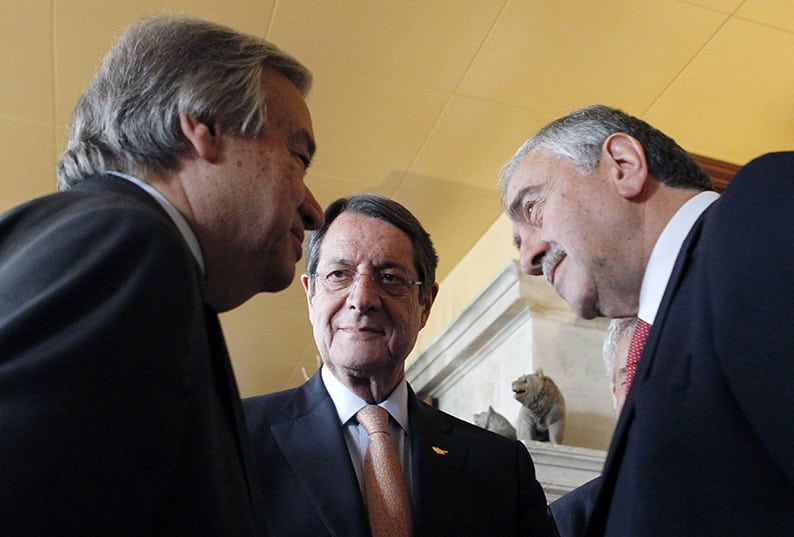UN efforts to convene an informal five-party meeting in a bid to resume negotiations for a Cyprus settlement are expected to start after April 2020 when Turkish Cypriots elect a new leader.
In the Meanwhile, UN Secretary-General Antonio Guterres might probe the guarantor powers – Greece, Turkey, UK – to ascertain the right time and appropriate conditions to convene the five-party summit.
Guterres, Cypriot President Nicos Anastasiades and the Turkish Cypriot leader Mustafa Akinci, had on Monday an informal dinner, in Berlin, to discuss the next steps on the Cyprus issue.
Nicosia sees the suspension of efforts as inevitable due to objections raised by Turkey, the problems the UK is currently facing and April 2020 elections in the Turkish Cypriot community.
It is up to the UN chief to decide whether his special envoy, Jane Holl Lute, will continue her efforts in Cyprus to conclude the terms of reference.
During dinner, the Turkish Cypriot side raised the issue of political equality, with the Secretary-General noting that discussions take place in light of all six parameters of his framework as a package and there can be no piecemeal approach.
The Greek Cypriot side referred to the issue of security and guarantees. It was also noted that political equality was singled out from the package by the Turkish Cypriot side and could thus not be discussed during dinner.
Nicosia does not expect any EU involvement in the informal five-party meeting that aims to conclude the terms of reference.
The EU was involved as an observer during the failed 2017 Conference on Cyprus, in Crans-Montana, as were Greece, Turkey and the UK.
The issue of hydrocarbons was not raised at the dinner or in the sperate meetings that preceded it. (source CNA)
UN Secretary-General’s Statement on Cyprus
This evening I met informally with the leader of the Greek Cypriot Community, Mr Nicos Anastasiades, and the leader of the Turkish Cypriot Community, Mr Mustafa Akıncı, to take stock of efforts toward reaching a comprehensive settlement of the Cyprus problem. Our discussions were focused and frank.
Both leaders welcomed my engagement and reaffirmed to me their commitment and determination to achieve a settlement based on a bi-zonal, bi-communal federation with political equality as set out in the relevant Security Council resolutions, including OP4 of UN Security Council Resolution 716 (1991).
The Turkish Cypriot leader and the Greek Cypriot leader, motivated by a sense of urgency, agreed that achieving a comprehensive and durable settlement to the Cyprus problem within a foreseeable horizon is of utmost importance to the future well-being of both communities and that the status quo is unsustainable.
The Greek Cypriot leader and the Turkish Cypriot leader affirmed their commitment to the Joint Declaration of 11 February 2014, the prior convergences, and the six point framework I presented on 30 June 2017 with a view to achieve a strategic agreement paving the way forward for a comprehensive settlement.
In view of these discussions, I have agreed to extend my efforts to achieve terms of reference to serve as a consensus starting point for phased, meaningful, and results-oriented negotiations at the earliest feasible opportunity.
In this regard, I committed to explore with the Turkish Cypriot leader and the Greek Cypriot leader and with the Guarantor powers the possibility to convene an informal five-plus-UN meeting at an appropriate stage.
It is acknowledged that this time must be different. I wish to extend my thanks to the government of the Federal Republic of Germany for its support in facilitating this meeting.







